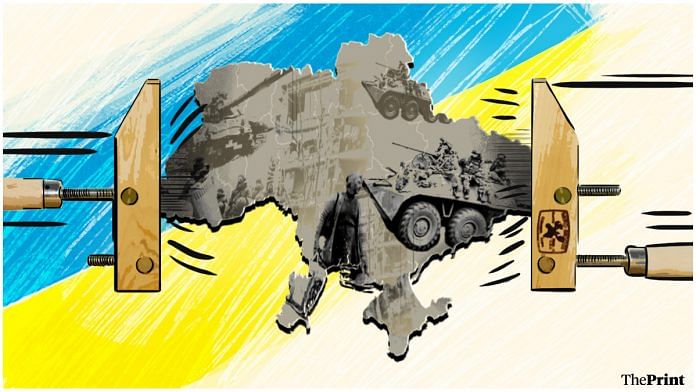Ukraine looms large on a map. It is the biggest country in Europe (not counting Russia), at about a fifth of India in terms of geographical spread. But such size is often deceptive. Its GDP is (or was) only one-twentieth of India’s. And its population is only twice that of Sri Lanka. This is not a country that should be taking on a former superpower like Russia, however diminished. That it has survived five months of an increasingly brutal war, ceding some territory while fighting Russia to a near-standstill, is testimony as much to Ukrainians’ fighting spirit and ingenuity as it is to the massive supply of Western armaments.
There is a cost. The World Bank has estimated that Ukraine’s GDP will shrink this year by 45 per cent. The latest estimates put the loss at a third or less. The other tally, in terms of lives lost or destroyed, is incalculable. Meanwhile, the country’s embattled president has said it will cost $750 billion to rebuild the civilian infrastructure. That is five times the country’s pre-war GDP, and the bill can only grow as the war continues. No one in the economically troubled West is going to cough up that kind of cash. What we are staring at is what happens in war: The near-destruction of a functioning state, like Iraq and Syria.
Russia too has paid a price. Its economy will shrink this year by 10 per cent. Its currency has seen sharp fluctuations, inflation is high at about 15 per cent, and production systems have been disrupted because of Western sanctions. But Vladimir Putin managed the economy well over the past two decades, so debt is only a fifth of GDP (India’s is about 85 per cent), and the higher oil and gas prices have kept money flowing in. To be sure, the effect of the sanctions and the challenge of continuing to feed the military machine will prove daunting. But President Putin sounds unfazed. If anything, he is upping his objectives for the “special military operation” that he launched on 24 February.
When one looks back from any war to its root causes, there is always blame to be shared — but also, often, the near-inevitability of classical Greek tragedy. So the story goes beyond Ukraine and its internal schisms, and stretches back to the collapse of the Soviet Union and its aftermath. For the people in the countries of central and eastern Europe, the democratic West and the wealthy European Union seemed better bets than an increasingly autocratic Russia with its history of imperial expansion. But as the European Union expanded eastward, and the North Atlantic Treaty Organization (NATO) followed, Russia felt besieged. One commentator put it aptly: The Western powers declared war on Russia, which then attacked Ukraine.
When one looks to the future, the question is whether the Western powers want to save a country still recognisably Ukraine though geographically shrunk, and whether Putin’s aggression is merely a response to Western provocations. If so, the issue is the size and shape of the carrot that will bring Russia to the negotiating table and end the conflict. But if Putin is over-reaching with revanchist goals, and if the West seeks to destroy the Russian threat once and for all (assuming that is a realistic objective, which it may not be), the war will continue and there will be no winners.
After all, the unprecedented sanctions on Russia cut both ways. Both the United States and Europe are paying an economic price, the latter more than the former. As the prospects of gas rationing loom, as economies slip into recession, and as the inflation curve reaches levels it has not done for decades, politicians in democracies will have to face their voters. European leaders, in particular, are caught between a rock and a hard place. They have had to give up a reliable source of energy supply, and now must militarise their economies while being asked to fund Ukraine militarily and economically. At what stage will the alliance crack? If it does not, because the real goal is to end the Russian threat once and for all, all one can say is: Poor Ukraine.
By special arrangement with Business Standard



